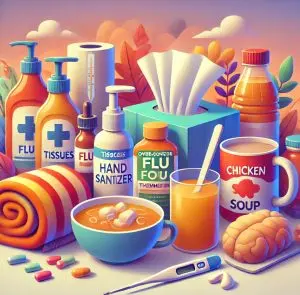In clinical practice, many parents worry that their child may have a weak immune system if they frequently catch colds. They often hope doctors will prescribe medicine to boost immunity. However, the number of colds a child gets is not always directly related to the strength of their immune system. This article explores the possible reasons for frequent colds in children and provides some scientific advice.
Does a Child Who Frequently Catches Colds Have a Weak Immune System?
To answer this question, we need to consider several factors:
Cold Frequency
According to statistics, children catch an average of 6 to 8 colds per year. This is within the normal range, especially for younger children whose immune systems are still developing and who are frequently exposed to new viruses. If a child falls within this range, there is usually no need to worry. However, if a child catches more than 8 colds per year over multiple years, it may indicate an underlying issue with their immune system.
Symptoms of the Cold
Colds usually come with typical symptoms like sore throat, fever, nasal congestion, and cough. If a child's symptoms are mostly nasal congestion and runny nose, and these symptoms occur repeatedly, it might not be a common cold but allergic rhinitis. An allergic reaction does not indicate a weak immune system; instead, it reflects an overreaction of the immune system to allergens like dust mites, pollen, or pet dander.
Recovery Time
Normally, a common cold should resolve within 7 to 10 days. If a child’s cold (excluding nasal allergies) takes more than two weeks to recover, it may suggest weakened immune function. Additionally, if the child also frequently suffers from other infections like ear infections, sinus infections, or pneumonia, special attention is needed.
How the Immune System Works
To understand whether a child has a weak immune system, it’s essential to know how the immune system works. The immune system is the body's "defense force," responsible for fighting off pathogens (like bacteria and viruses) and abnormal cells within the body. It relies on several key organs and cells to function:
Spleen: Acts as a filter, removing pathogens from the blood and activating the immune response.
Tonsils: Guard the respiratory tract, preventing pathogens from entering.
Bone Marrow: Serves as a "factory" for immune cells, producing white blood cells, especially B cells and T cells.
Lymphatic System: Functions like a "transportation system" for immune cells, carrying and filtering pathogens.
B cells produce antibodies that help identify and eliminate invading pathogens, while T cells directly attack infected cells or coordinate other immune cells. If any part of the immune system is not functioning properly, a child may get sick more often, experience recurring infections, or have slow recovery times.
Common Causes of a Weak Immunue System in Children
While some children may be born with weak immune systems, in most cases, immune problems are temporary. Here are some factors that can lead to temporary immune system decline:
Immune Suppression During Illness
When a child is sick, their immune system may temporarily weaken while fighting off the illness, making them more susceptible to other infections.
Malnutrition
A lack of key nutrients like vitamin C, vitamin D, and zinc can lead to immune system deficiencies.
Lack of Sleep
Chronic sleep deprivation weakens the immune system, making children more prone to illness.
Stress and Anxiety
Particularly during periods of high stress (such as before exams), stress hormones like cortisol rise, which can suppress the immune response.
Poor Hygiene Habits
Hand hygiene and environmental cleanliness also play a role in a child’s health, as poor hygiene can increase the risk of infection.
How to Help Children Strengthen Their Immune System
Parents often look for medications or supplements to boost their child’s immune system. However, healthy lifestyle interventions are often more effective at improving immune function.
Balanced Diet
Ensure your child consumes enough vegetables, fruits, proteins, and nutrient-rich foods. Foods high in antioxidants and essential nutrients help support the immune system.
Adequate Sleep
Good sleep is crucial for the immune system's repair process. Preschoolers should get 10-13 hours of sleep per day, while school-age children need 9-12 hours.
Exercise and Outdoor Activities
Moderate exercise can enhance immunity, and outdoor activities also help the body produce vitamin D, which is vital for bone and immune health.
Good Hygiene Habits
Encourage proper handwashing and limit exposure to crowded places during peak cold seasons.
Reduce Stress
Create a supportive emotional environment for your child, reducing unnecessary stress and anxiety, and helping them learn coping skills for life's challenges.
A child's immune system is still developing, so frequent colds don't necessarily mean they have a weak immune system. If a child experiences frequent colds along with other infections or slow recovery times, parents should take the child to a doctor for an evaluation. Relying on medications to boost immunity is not the best solution; a healthy lifestyle is the key to strengthening the immune system.
Reference:
Centers for Disease Control and Prevention (CDC) - Provides information on the common cold, including symptoms and when to seek medical attention.
CDC: Common Cold
American Academy of Pediatrics (AAP) - Offers guidelines and insights into children's health, including the immune system and factors affecting it.
AAP: Immunity and Illness
National Institute of Allergy and Infectious Diseases (NIAID) - Discusses immune system development in children and common immune-related conditions.
NIAID: The Immune System
Mayo Clinic - Offers advice on managing frequent colds in children and lifestyle factors that can influence immune health.
Mayo Clinic: Colds in Children
World Health Organization (WHO) - Provides general information about nutrition and its role in supporting the immune system.
WHO: Healthy Diet













